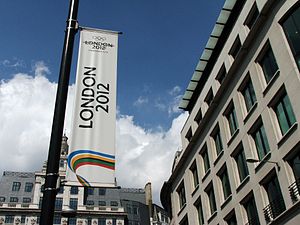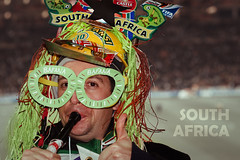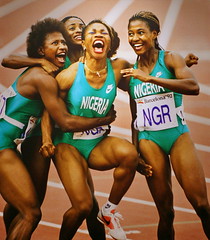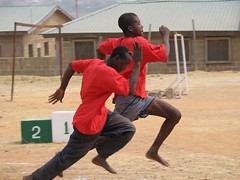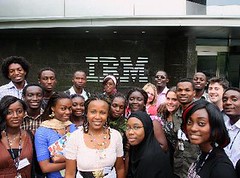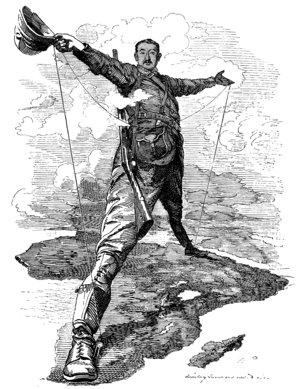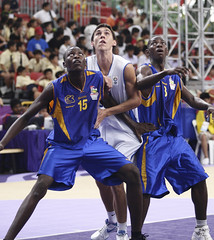|
|
| CAPE TOWN/SOUTH AFRICA, 4JUN08 - FLTR: Pierre Nkurunziza, President of Burundi, Bingu Wa Mutharika, President of Malawi, Thabo Mbeki, President of South Africa, Klaus Schwab, Founder and Executive Chairman, World Economic Forum, John Agyekum Kufuor, President of Ghana, and Raila Amolo Odinga, Prime Minister of Kenya, captured during the World Economic Forum on Africa 2008 . Image: Eric Miller (Photo credit: Wikipedia) |
As
Joyce Banda, Malawi’s First
Female President and
Head of State, was sworn in this month, many
Malawians were ecstatic. During the spectacle that occurred after late President
Bingu wa Mutharika’s cardiac arrest which resulted in his death, foreign journalists debated
whether Malawi was “ready” for a female president. Some Malawians asked
the same question, speculating that a constitutional coup would occur
that would prevent her from assuming this role. Forgotten was the role
that women such as former Official Hostess (First Lady),
Cecilia Kadzamira played in the nation. She was the most powerful woman in Malawi for three decades. Towards the end of
Kamuzu Banda’s
presidency, she essentially run the country and was the de facto
president. Therefore in recent history, Malawi has had a precedence of a
strong female leader. However, what was also forgotten was a long
tradition of female leadership in Malawi and Africa as a whole that came before her. As
Africans, I think that it’s important for us to have a common, accurate
and collective memory with regards to historical
events
on the continent, including societal issues. As Malawi ushered in the
First Female Head of State in SADC, the media and public were
mis-educating each other about the real progress of female leadership in
Africa in various ways.
|
|
| Joueur d'Uruncungo (Player of Uruncungo) Women played an active role in business and trade in the markets (Photo credit: Wikipedia) |
I will start with the terminology. In order to have a head of state, there needs to be a
state.
Prior to the Berlin Conference of 1884, where African states
originated, there were no states in Africa. However, there were other
forms of political units that had leadership like Kingdoms, Empires,
Chieftaincies, clans, or ‘tribes’. Many of these political arrangements
in Africa were matrilineal
(traced ancestral descent
through the maternal line), matrilocal (husband goes to live with the
wife’s community), or matriarchal societies (A woman who rules a family,
clan, or tribe). These arrangements lead to a long list in history of
African leaders like Cleopatra of Egypt,
Queen Nzinga M’Bandi of Angola, Princess
Grace Matamba of Congo,
Queen Nana Yita of Nsuta (Ghana),
Queen Nana Aberewa Ampen of Juaben (Ghana),
Sultan Fatimah of North Zanzibar (Tanzania),
Ret Abudok nya Bwoc of Shilluk (Sudan). Over the years this
history of female leadership in Africa,
has continued in many rural areas. Therefore, if we are to only look at
our history, we may conclude that Africa has always been ready.
In fact, prior to colonialism Africa’s real traditional culture, was
more gender progressive then the hybrid system that was introduced
during the colonial era. Traditional
African culture
has always been more gender neutral then the cultures of the global
north where patriarchy and capitalism have created inequalities that
have challenged for female leadership. Gender roles in African culture
have traditionally more fluid. Africans women were serving as spiritual
leaders (contemporary day pastors, priests), healers or sangomas,
(midwives, nurses, doctors), herbalists (pharmacists), traders (business
women) and other prominent positions. Women were also able to own
property and had political participation. During this same era, western
women were not able to play these roles in their own societies.
Therefore when colonialism was introduced state sponsored patriarchy,
African women legally lost their social and political positions. African countries became states during the colonial era where Africans were
not in charge of their own states. This made the ascension of African
women difficult because both African men and women could not be heads of
state. They could not practice their traditional leadership roles that included women under this new system. This
means that women’s leadership in Africa has been more about reclaiming
rights we lost under colonialism rather than achieving them for the
first time. In contemporary times, challenged with regaining female leadership on
the continent under new political formations, the modern state,
African countries have made considerable gains. I compiled a descriptive list of contemporary
women Heads of State in Africa that have been head of state that we can draw on to begin to pull our collective memories together:
1.
Ruth Sando Fahnbulleh Perry (Liberia) – Appointed, First Female Head of State in Africa, First Female Head of State in West Africa.
2.
Ellen Sirleaf-Johnson
(Liberia) – Elected, Second Female Head of State in Africa, First
Elected Female Head of State in Africa, Second Female Head of State in
West Africa.
3.
Joyce Hilda Mtila Banda
(Malawi) – Appointed, Third Female Head of State In Africa, Second
Appointed Female Head of State in Africa, First Female Head of State in
Malawi, First Female Head of State in Southern Africa.
|
|
| Rice (left) and Laura Bush (second from the right) meet Liberian President-Elect Ellen Johnson Sirleaf (center), the world's first black female president, before Sirleaf's inauguration in Monrovia on January 16, 2006 (Photo credit: Wikipedia) |
In addition, there have been African
women that have acted as head of state like President Rose Francine Rogombé of Gabon who served as interim head of state and
Sylvie Kinigi of Burundi, and
Carmen Pereira,
of Guinea Bissau. Perhaps, the difficulty in including them on the list
is can be explained by terminology. The titles ‘Interim’, ‘Acting’, and
‘Appointed’ Heads of State may suggests a short term, temporary
arrangement. It can also imply that the person is not the ‘real’ head of
state. What is also problematic is confusion that arises over who is
the head of state in political units. African countries have mixture of
heads of state that have the title of President or Prime Minister – some
countries others have both positions. However there is evidence that
there is room to extend this
list in the African context.
Therefore, as journalists frantically try to meet deadlines in the
corporate media houses, there is little time for them to take an
accurate survey or analysis of female leadership. In addition, many
journalists in the global North already have a limited knowledge of
Africa. They seldom take the time to do their own research on the
history of the continent outside of highlighting data centered on
societal factors like the level of poverty, disease and women’s
oppression. Therefore, this often leads to the misrepresentations and
distortion about the dynamics of topics like gender and leadership on
the continent. Many have never heard of
Ruth Perry,
the first African Head of State in Africa (1996-1997) who was succeeded
by Charles Taylor in Liberia. She is sometimes not regarded as Head of
State, however, many do differentiate Sirleaf-Johnson by noting that
Sirleaf-Johnson is the first
elected head of state. However we
must decide how we want Perry to be remembered because she is in danger
of being forgotten in our collective memories in spite of this
achievement. In addition, because of the global practice of sourcing
news from a few media outlets like Reuters or the Associated Press, at
times, African journalists often source their material from these media
outlets and end up unintentionally doing the same. This is why Africans
need to have a collective memory about their history in terms of female
leadership.
|
|
| Queen Nzinga in peace negotiations with the Portuguese governor in Luanda, 1657. (Photo credit: Wikipedia) |
It is important to note that there have been a countless number of women
that have been serving as Prime Ministers, Presidents (that may not
necessarily be head of state) or vice-president in Africa in recent
history. However, there needs to be recognition that these women,
including Sirleaf, Perry and Banda, are following in the footsteps and
tradition of Africa’s long record of female leadership. In order to
answer burning questions about our countries’ “readiness” for female
leadership, we need to understand our own histories outside of the
‘popular imagination’ of what Africa is. This question is based on
assumptions on the level of gender equality in Africa. The assumption is
that African men and African societies are sexist due to gender
inequalities inherent or rooted in African traditional societies. This
is simply untrue. African women in traditional societies have been
leaders, healers, priestesses, and property owners. These rights that
were increasingly denied to them under colonial patriarchy, and this
then carried on beyond colonialism. African Women largely lost their
rights and never regained them. There are several accounts of women’s
participating in the political process by signing treaties as well as
accounts of colonialist refusing to negotiate treaties with African
women. These attitudes reflected gender relationship inequalities in
western societies. These attitudes also continue to affect western women
in countries that are highly capitalist and therefore, highly
patriarchal. Therefore, our challenge today is to reclaim and regain
traditional role as leaders for African women. Our challenge is also to see African tradition as progressive in terms of gender equality. However, we must have a
collective memory with regards to our histories and herstories. This means learning
about African history and recognizing the achievements of all our women.
*A version of this article appeared on the blog
Africa on the Blog.








